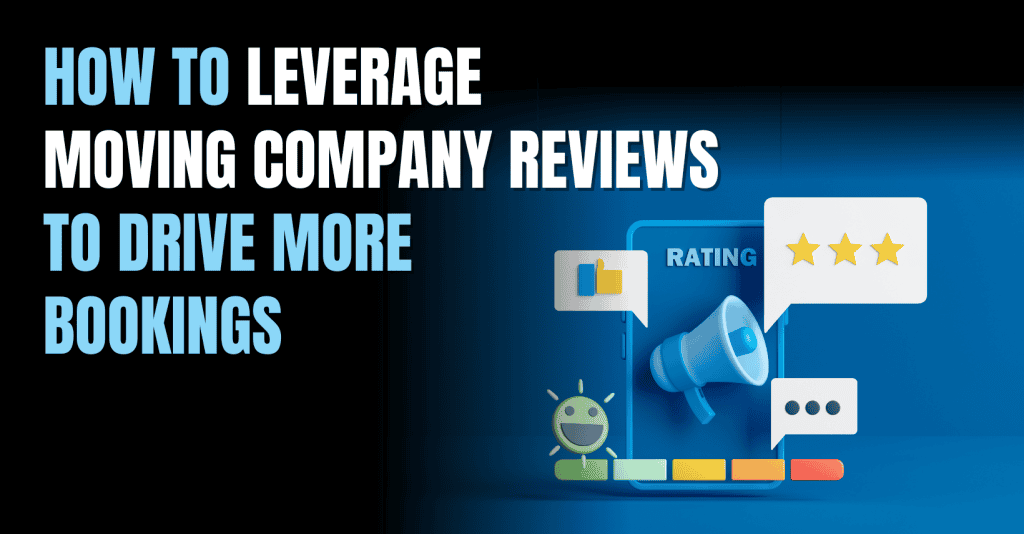If you run a moving company, you know how important word-of-mouth is. Online reviews are basically the modern version of that—but way bigger. Potential customers aren’t just checking your website anymore—they’re reading your ratings, skimming past reviews, and deciding whether to call you or someone else. A single bad review can make someone think twice, while a string of positive reviews can turn your business into the obvious choice.
This guide will break down why reviews matter, the different types you’ll see, how they affect your bottom line, and practical steps to manage and leverage them so you get more bookings and build trust with your clients.
Why Online Reviews Matter
Online reviews aren’t just “nice to have”—they can directly impact your business. A few thoughtful reviews can boost leads, improve visibility, and even drive bookings, while a single unresolved complaint can quietly push potential clients toward your competitors.
People trust reviews more than marketing copy. Even a half-star difference can sway a lead. Detailed feedback about professionalism, punctuality, or care with belongings reassures prospects that you handle moves responsibly and reliably.
Reviews also affect how easily clients find you. Search engines like Google consider review quantity and quality when ranking local businesses. More positive reviews mean more eyes on your website and booking pages—and ultimately, more calls coming in.
Tip: Highlight your best reviews on your website or booking pages—seeing them right before deciding can tip a potential client toward calling you.
What’s the Difference Between Stars and Reviews?
Not every review carries the same weight. A star rating gives a quick impression, but the story comes from the comments.
What to look for:
- Patterns in feedback: Are multiple clients praising careful handling? Mentioning delays? Patterns reveal both strengths and areas to improve.
- Positive details: A five-star rating with notes on punctuality and professionalism is more convincing than a simple “Great service!”
Handling negative reviews
Even rare complaints can influence decisions, but how you respond matters more than the issue itself. Acknowledge mistakes, offer a small fix or future perk, and you can turn a frustrated client into a loyal one.
How Reviews Affect Your Bottom Line
Reviews don’t just shape your reputation; they affect revenue.
Positive reviews bring more calls and bookings. Clients are more likely to reach out when they see proof of quality service. Even small increases in star ratings can translate into noticeable business growth.
Negative reviews can drive clients away. Ignoring complaints can cost business. One unresolved issue about damaged items or missed timelines can scare potential clients off.
It’s critical to use feedback to improve operations. If multiple reviews mention delays or communication issues, it’s a clear signal to adjust processes. Fixing recurring problems makes future reviews stronger and client satisfaction higher.
Tips for Monitoring & Managing Reviews
You can’t improve what you don’t track. Staying organized and proactive is key.
Track All Reviews
- Google, Yelp, Facebook, and niche directories matter. Don’t overlook any platform for reviews.
- Use alerts or dashboard tools to keep everything in one place.
Ask Strategically
- Request them right after a successful move, while the experience is fresh.
- Make reviews easy for clients to submit (review cards are a great option).
- Personalized emails or texts work better than generic forms.
Prioritize Responses
- Address negative or critical reviews first, but don’t ignore minor feedback. Every review is an opportunity to show clients you care.
Look for Trends
- Keep a simple log to spot patterns.
- Use insights to train staff and tweak processes.
Quick tip: Checking reviews weekly keeps you on top and allows you to respond promptly before things escalate.
How to Respond to Reviews Effectively
How you reply is just as important as the review itself. A thoughtful response can turn a frustrated customer into a fan.
Key principles:
- Be professional and polite: Stay courteous, even if a review seems unfair.
- Be specific: Reference details mentioned in the review.
- Acknowledge mistakes: Own up to errors without making excuses.
- Take complex issues offline: Invite the customer to discuss privately.
- Close on a positive note: Thank the customer and reaffirm your commitment to quality service.
Here’s an example of how to respond to both a positive and negative review. Try these out for your next review response and see how it lands with your audience.
- Positive Review: “Thanks, Sarah! We’re thrilled your move went smoothly and our team handled everything with care. We really appreciate your feedback!”
- Negative Review: “We’re sorry your experience didn’t meet expectations, John. Please contact our office so we can make this right.”
Grow Your Business by Leveraging Positive Reviews
Reviews can do more than provide feedback—they can actively grow your business.
Ways to leverage reviews:
- Show them off: Feature reviews on your website, social media, and marketing materials.
- Encourage referrals: Happy clients are your best marketers—ask them to share their experience.
- Train and improve: Use insights from reviews to refine processes and train staff.
- Build credibility: Consistent, positive reviews signal professionalism and reliability.
Tip: Rotate featured reviews on your homepage to keep content fresh and trustworthy.
Ready to Make Every Review Work for You?
Online reviews influence who calls, clicks, and books. If handling feedback feels like a juggling act, it’s time to take control.
At Moving Marketing Results, we help moving companies track, respond to, and leverage every review so your reputation drives growth. Whether you’re just getting started or want a professional strategy in place, we’ll help you turn customer feedback into a powerful engine for your business.
Schedule a free consultation today—let’s transform reviews into a steady stream of trust, leads, and booked moves you can count on.


